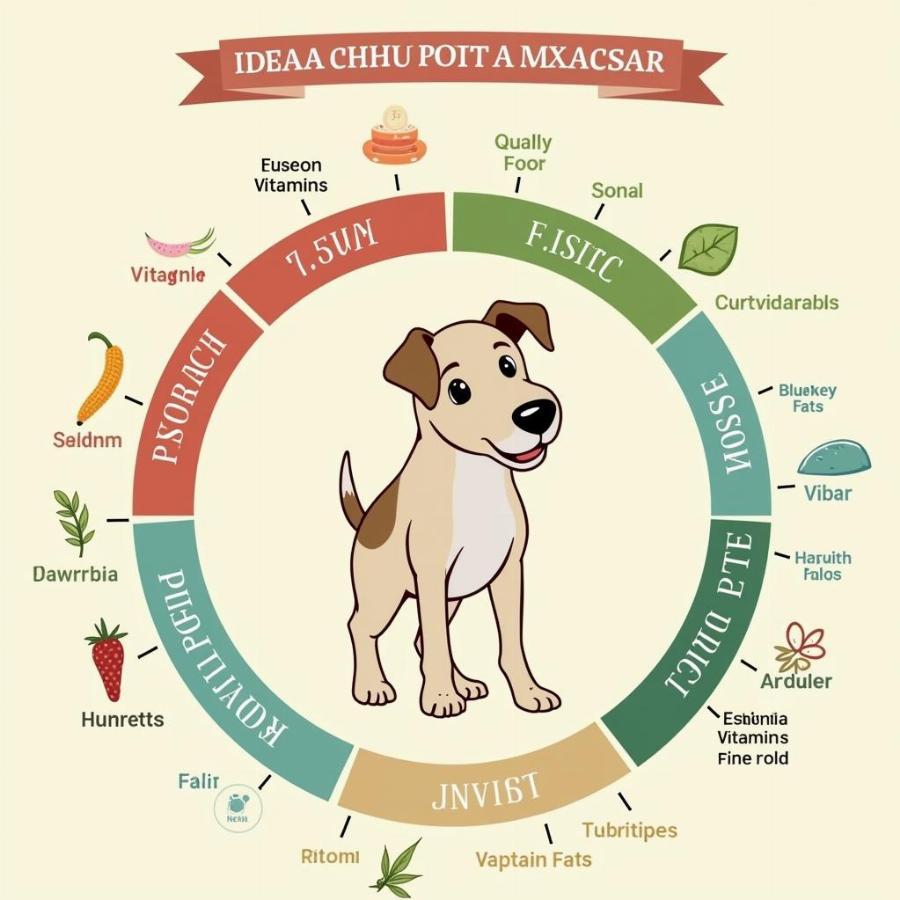Understanding the nutritional needs of your lazy dog is crucial for their overall health and well-being. While their laid-back lifestyle might suggest they need less food, lazy dog nutrition information is just as important as it is for active breeds. Providing the right balance of nutrients can prevent obesity, boost energy levels, and contribute to a longer, happier life for your furry friend.
Decoding Your Lazy Dog’s Diet: Essential Nutrients
Just like us, dogs need a balanced diet filled with essential nutrients. This includes proteins, fats, carbohydrates, vitamins, and minerals. Proteins provide the building blocks for muscles, while fats contribute to a healthy coat and skin. Carbohydrates supply energy, and vitamins and minerals support various bodily functions. For lazy dogs, portion control is key to prevent weight gain.
Protein Power: Building Blocks for a Healthy Body
Protein is especially important for maintaining muscle mass, even in less active dogs. Choose high-quality protein sources like chicken, beef, lamb, fish, or eggs. Avoid processed meats or fillers that offer little nutritional value.
Fats for a Shiny Coat and Healthy Skin
Healthy fats are crucial for a glossy coat, healthy skin, and proper organ function. Look for dog foods containing omega-3 and omega-6 fatty acids, found in fish oil and flaxseed. These essential fatty acids also help with brain function and joint health.
Carbohydrates for Energy: Finding the Right Balance
While carbohydrates provide energy, too many carbs can lead to weight gain in lazy dogs. Opt for complex carbohydrates found in whole grains, fruits, and vegetables. These are digested slower, providing a steady release of energy and helping your dog feel fuller for longer.
Tailoring Nutrition for Your Lazy Dog’s Specific Needs
 Biểu đồ dinh dưỡng cho chó lười biếng
Biểu đồ dinh dưỡng cho chó lười biếng
Every dog is unique, and even within “lazy” breeds, there can be variations in activity levels and metabolism. Factors like age, breed, and underlying health conditions also play a role in determining nutritional needs.
Age Matters: Puppy vs. Adult vs. Senior Lazy Dogs
Puppies, even the lazy ones, need more calories and nutrients to support growth. Adult lazy dogs require a maintenance diet to prevent weight gain. Senior dogs may benefit from a diet lower in calories but higher in certain nutrients to support joint health and cognitive function.
Breed-Specific Considerations: Size and Predispositions
Larger breeds may require different nutrient ratios compared to smaller breeds. Some breeds are also predisposed to certain health conditions, which may necessitate a specialized diet. For example, a King Charles Spaniel, despite its relaxed nature, might require a diet tailored to support heart health. You can learn more about the breed and its price at our king charles spaniel dog price page.
Addressing Health Concerns: Allergies and Other Issues
If your lazy dog has allergies or other health issues, consult with your veterinarian. They can recommend a special diet or supplements to manage these conditions. For example, dogs with sensitive stomachs might benefit from a limited ingredient diet.
Feeding Frequency and Portion Control: Managing Your Lazy Dog’s Intake
How often and how much you feed your lazy dog is just as important as what you feed them. Overfeeding can easily lead to obesity, which can exacerbate existing health problems and shorten their lifespan.
Establishing a Regular Feeding Schedule
Feeding your dog at the same times each day helps regulate their metabolism and prevents them from overeating. Avoid free feeding, where food is constantly available.
Lazy Dog Nutrition: Frequently Asked Questions
Q: Can I feed my lazy dog human food?
A: While some human foods are safe for dogs, many are toxic. Stick to a balanced dog food formulated to meet their specific nutritional needs.
Q: How can I tell if my lazy dog is overweight?
A: You should be able to feel your dog’s ribs easily without pressing hard. If their ribs are difficult to feel, or if they have a noticeable belly, they may be overweight. Our four dogs menu article might also be of interest to you.
Q: What are some healthy treats for lazy dogs?
A: Opt for low-calorie treats like carrots, green beans, or air-popped popcorn (without butter or salt). You can also find commercially available low-calorie dog treats.
Conclusion: Nourishing Your Lazy Companion for a Long and Happy Life
Providing the right nutrition is a vital part of caring for your lazy dog. By understanding their specific needs and following the tips outlined in this guide, you can help your furry friend maintain a healthy weight, boost their energy levels, and enjoy a long and happy life. Remember to consult with your veterinarian for personalized dietary recommendations. Are you looking for gluten-free options? Check out our lazy dog gluten free menu for ideas.
Beaut Dogs is your trusted source for comprehensive and reliable information on all aspects of dog care. For personalized advice on lazy dog nutrition, please contact us at Email: [email protected]. We are dedicated to helping you provide the best care for your canine companion. Visit us at Beaut Dogs.
You might also be interested in our article on prairie dog restaurant for some fun dining ideas. Do you enjoy making toys for your dog? Our dog toys pdf guide offers various creative options.